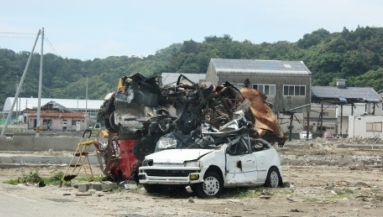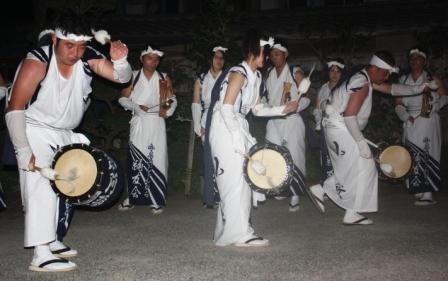3. Effects of the nuclear accident on safety requirements in the future
@To promote the policy of developing the nuclear power plant, our government and all major electric power companies created a myth that there is absolute safety in a nuclear power plant. The companies insisted that the plant was equipped with complete facilities for emergent crisis such as the Emergency Core Cooling System which are in conformity with the severe legal requirements for safety. However, the most serous accident equivalent to that at Chernobyl Electric Power Plant occurred at the Fukushima No. 1 Nuclear Power Plant by a gigantic earthquake and the Tsunami on March 11. After the occurrence of the accident we blame our government and Tokyo Electric Power for their carelessness caused by believing in this myth. Then, our government began discussing how to strengthen the safety requirements at a nuclear power plant. Before finish of this discussion, Naoto Kan, our prime minister, took the following measures.
@In Japan there are 54 nuclear power plants in action, one of which is Hamaoka Nuclear Power Plant in Shizuoka Prefecture. We worry about a future serious accident at Hamaoka Plant, because scholars estimated the 87% possibility of being hit by a gigantic earthquake with over magnitude 8 and the Tsunami following by it within 30 years. On May 6 Kan requested Chubu Electric Power suddenly to stop all three nuclear reactors at Hamaoka Plant until the finish of construction of banks against the Tsunami behind a sand hill along sea coast. Three days later the company had to accept this request. However, people still worry about the future serious accident at the Hamaoka Plant. On May 28 several residents sued Chubu Electric Power for abolishment of the Hamaoka Plant.
@In Japan we do not have strong movement against the nuclear power plant like in Germany. Although majority of Japanese affirm the current situation of producing nuclear electric power, people sharing the opinion against a nuclear power plant have increased since the accident at Fukushima No. 1 Nuclear Power Plant. On April 16 and 17 Asahi Newspaper carried out the opinion research on production of nuclear electric power. The percentage of gincrease in the productionh, gmaintenance of the current productionh, gdecease in the productionh and gstop of the supply of nuclear electric powerh is 5%, 51%, 30% and 11% respectively. To compare with results of the corresponding research in 2007 the answer of gdeceaseh and gstoph was lifted from 21% to 30% and from 7% to 11% respectively, while the answer of gincreaseh declined from 13% to 5%. In the consideration of the change in the public opinion it becomes difficult for our government and electric companies to maintain their policy of increasing in production of nuclear electric power in the near future.

4. Alternative sources for electric power
@Previously, we had high techniques for generating solar energy. However, the wide use of solar energy was blocked by electric power companies under the national policy of promoting the increase in nuclear electric power. Ten major electric power companies had absolute monopoly on supplying electric power in each region without any competition. To supply electric power at the cheaper price, the policy of developing the free market started in 1995. However, the share of electric power supplied through the market remains very small, because the major electric companies continue to monopolize facilities to send electric power. It was not until March 11, 2011 that the government started discussing the new measures to cope with the disadvantage of the current monopoly system in order to increase in the supply of electric power generating by natural energy through the market.
@On May 24 Kan flew to Paris to attend G8 and G20 meetings held in Deauville, of which a host was Nicolas Sarkozy a French president. Sarkozy has promoted the policy of developing the nuclear electric power. Worry about the criticism for his policy, on April 1 he flew to Tokyo to talk with Kan about how to cope with the nuclear accident in Fukushima.
@By the request of Sarkozy, Kan gave a speech as the first key speaker at an opening luncheon for G8 on May 26. He appealed for his contribution to strengthening of legal requirements for safety at a nuclear power plant by offering information about the accident at Fukushima No. 1 Nuclear Power Plant. His appeal was welcomed by Sarkozy, because the severe requirements offer an advantage to France for exporting nuclear power plants. In addition, Kan talked about the policy to lift the rate of electric power generated by natural energy to 20% among all electric power by the early 2010s by adopting such measures as equipping with a solar panel on the roof of 10 million houses. However, he expressed this policy suddenly without the previous consultation with ministers in his cabinet. Banri Kaieda, the Minister of Economy, Trade and Industry in charge of energy policy felt embarrassed at the press conference on May 27, as he was informed for the first time by news reporters about Kanfs idea about the expansion of solar energy. We welcome the policy of widening the use of natural energy generating by sunlight and wind. However, we doubt how to realize this policy concretely in the poor national financial situation, as our government does not yet have concrete ideas about how to secure money for re-construction of facilities for people suffered great damage by the earthquake and the Tsunami.

5. Decision Making Process
@Naoto Kan is regarded as a politician playing to the grand stands, whose main interest is to hold a position as a prime minister. Therefore, he appears to lack the political support to take the initiative in reconstruction of society for people suffered by the earthquake and the Tsunami, and in introduction of the measures to prevent further damage at Fukushima No. 1 Nuclear Power Plant. There are continuing concerns about this serious and possibly ongoing political confusion, even after Kan announced the promise of his resignation in the near future from the position as a prime minister on June 2.
@In Japan, there are many problems to resolve following the big disaster on March 11 in 2011. The measures to cope with an accident at Fukushima No. 1 Nuclear Power Plant are but a part of many recovery issues to be resolved.
@This essay was written in June, 2011.
| Previous Page | Return to Top Page | Next Page |
|---|